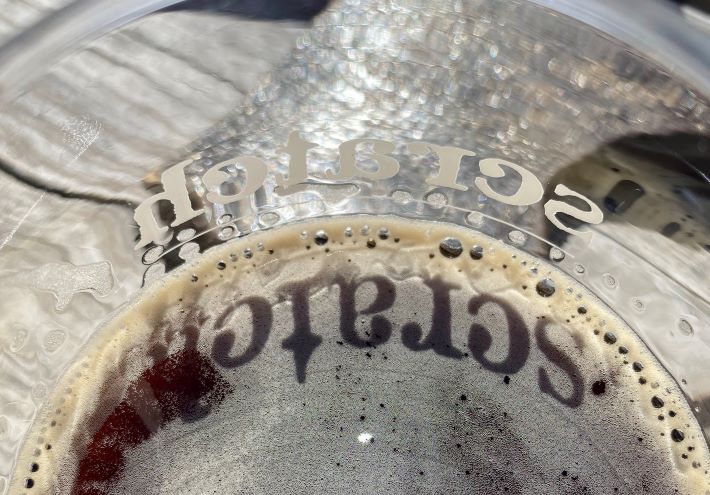
St. Louis-based Sauce magazine has six suggestions for brewery/hike combinations in Missouri and Illinois. Of course, Scratch Brewing is one of the destinations. The story would lose all credibility if it were not. We made time eight days ago to get to rural Ava and sample everything on tap. The beers were tasting as wonderful, maybe more wonderful, than always. That’s a fig porter (made with fig leaves, not the fruit) in the glass.
Now to the links . . .
Tin Whiskers, a brewery in Minnesota, is closing. “A lot of people are getting in that think it’s easy — easy money,” says Tin Whiskers owner Jeff Moriarty. “I feel like a bubble is coming — a reckoning is going to happen.”
The brewery, the last to operate in downtown St. Paul, has been in business eight years. There were plenty of local stories, but little additional insight. However, the discussion at Beer Advocate is pretty interesting.
Just so you know, two Dallas-Fort Worth breweries also closed last month. There was no mention of a reckoning.
ON LANGUAGE
In search of elegant wine. I saved this story because the headline grabbed my attention. Before I got around to reading it I thought a bit about what attributes in beer, or simply what beers, I might describe as elegant. I know I’ve used the word. Not a lot, but apparently without proper thought. Honestly, this story didn’t help a lot. However, perhaps you can take the suggestion about what makes a mathematical proof elegant and make use of it.
Crispy. Jeff Alworth chimes in on the use of the word crispy, a topic I already said what I have to say about in February.
There was a certain amount of conversation when he posted a link on Twitter.
Which was followed a tweet from Matthew Curtis about “beer writers policing language that becomes part of a drinkers vernacular” and more comments.
And eventually this from Alan McLeod:
“While I agree that policing is fundamentally silly there is possibly an underlying question: is there any meaningful standard upon which the self-appointed might do such a thing? For the best part of twenty years doing this, I am left with the impression that too much of what has been written about good beer has been larded with a sameness made up of business promotion, recycling of the works of others, forms of oversimplification** mixed with claims to expertise and a certain code compliance. Is ‘crispy’ an example of that code? Maybe. I don’t have an exact idea what is meant when used. But it’s not unique in that regard. And I’m not sure that is the point. It seems that circles of praise gather whenever someone achieves the great gold ring of getting paid for their written code compliant words, as if that is the main end of beer writing.”
After you consider the intriguing question McLeod raises — What is the main end of beer writing? — there is this.
In “Democracy, authenticity, and the enregisterment of connoisseurship in ‘craft beer talk’” (Language & Communications 75 (2020) author Lex Connelly draws a parallel between oinoglossia (wine talk) and brutoglossia, (craft) beer talk (just focus on the words that make sense to you).
My takeaway, further informed by non-beery books I’ve been reading, is likely different from yours what yours might be. I think there is more to this what’s going on than hipster affectations and peer skeptically over the tops of my my glasses when I come across sentences that contain these words: “the key kind of class distinction in late capitalism.”
So, I suggest that some beer drinkers (writers and citizens themselves) may use language, tasting rituals and what they view as the importance of authenticity to accrue cultural capital. In “Distinction,” French sociologist Pierre Bourdieu posits that cultural capital (as opposed to economic capital) is an accumulation of knowledge and skills that demonstrate social status.
(You know if you know. Guilty here.)
Anchor Brewing savior Fritz Maytag once said, “It’s very hard to get pretentious about beer. You can become knowledgeable and start to talk with a highfalutin’ vocabulary. But you can only go so far with beer, and I’ve always liked that.”
Perhaps, but beer drinkers who adopt specialized language (i.e. crispy boi) that means nothing to my neighbors may be as intent on collecting cultural capital as those who celebrate elegant wine. That’s fine, unless that capital is used as a weapon to exclude those without similar special knowledge from joining the craft beer club.
PUBS
The whole point. “The Ted Lasso pub is just a pub.” Locals in the UK take the pub for granted. Viewed from afar it is idyllic.
Pressing play. And so it begins, “Over the weekend, I travelled on a number of different trains to a couple of different pubs and beer events. It was the first time since the start of the pandemic that everything about the day felt part of a previous lifetime; one that had been merely paused for a couple of years and restarted.”
Double threat. What’s the greater danger? A 26-story going up next door to a 200-year-old pub and leaving it permanently in the shade or Heineken installing its own manager?
With those beer prices you'd think they could afford to paint the ceiling. pic.twitter.com/YwuN5jJ3dq
— The Beer Nut (@thebeernut) April 3, 2022
Click on the photo on the left for details.